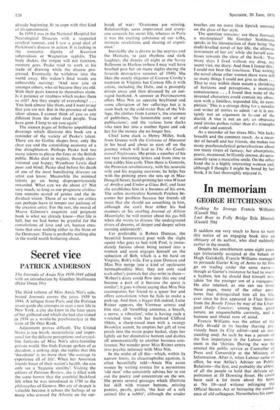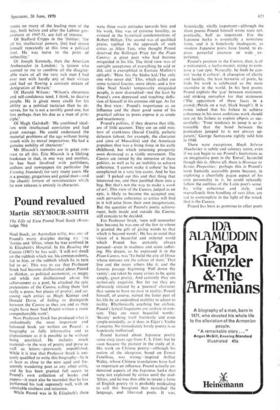In memoriam
GEORGE HUTCHINSON
Nothing So Strange Francis Williams (Cassell 50s) Last Boat to Folly Bridge Eric Hiscock (Cassell 30s) It saddens me very much to have to turn this notice of an engaging book into an obituary of its author, who died suddenly earlier in the month.
Despite his ennoblement some eight years ago (reluctantly accepted at the behest of Hugh Gaitskell), Francis Williams managed to persuade Garter King of Arms to let him go on trading under the same name— though at Garter's insistence he had to insert a hyphen, lest he should find himself mis- taken 'for the younger son of a marquess.' He also retained, as one can see from these pages, many of the other attri- butes that distinguished him all his life, ever since he first appeared in Fleet Street from the Bootle Times by way of the Liver- pool Daily Courier: among them, good nature, an unquenchable curiosity, and a humane and liberal turn of mind.
Francis Williams was the editor of the Daily Herald in its heyday (having pre- viously been its City editor—and an out- standing one). As such he was a person of the first importance in the Labour move- ment in the 'thirties. During the war he entered the public service as Controller of Press and Censorship at the Ministry of Information. After it, when Labour came to office, he was Attlee's Adviser on Public Relations—the first, and probably the ablest, of all the people to hold that delicate ap- pointment at 10 Downing Street. He could have said a lot more about his term at No 10—and without infringing the Official Secrets Act or betraying the confid- ence of old colleagues. Nevertheless his com-
ments on many of the leading men of the day, both before and after the Labour gov- ernment of 1945-51, are full of interest.
Of Stafford Cripps in the 'thirties: 'for all his intellectual powers, the] had shown himself repeatedly at this time a political fool. He was naive to the point of imbecility.'
Of Joseph Kennedy, then the American Ambassador in London: 'a tycoon who seemed to me to combine all the disagree. able traits of all the very rich men I had ever met with hardly any of their virtues and had set flowing a constant stream of denigration of Britain.'
Of Harold Wilson: 'Wilson's cleverness and self-confidence tend, I think, to deceive people. He is given more credit for his ability as a political tactician than he de- serves, for he is not a terribly good one, but less perhaps than his due as a man of prin- ciple.'
Of Hugh Gaitskell: 'He combined ideal- ism with intellectual conviction and had great courage. He could understand the material problems of the age without losing touch with its moral imperatives. He had a genuine nobility of character.'
Mr Hiscock's memoirs are in great cone tract to all this. Eric Hiscock is a lifelong bookman in that, in one way and another, he has been involved with publishers, authors and newspapers (in particular the Evening Standard) for very many years. He is a gossipy, gregarious and genial man—and the chaotic torrent of reminiscences which he now releases is entirely in character.



































 Previous page
Previous page